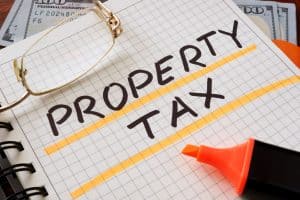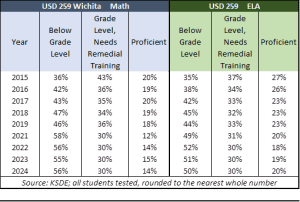A proposed amendment to the Kansas Constitution limiting yearly property valuation increases to 3%, except under certain conditions, is one vote short of the necessary 2/3 required for passage before being submitted to voters. A final vote on the measure, with one senator describing it as “do or die”, is set for Monday April 3rd. The current tally is 26 in favor, 14 opposed; 27 votes are required for adoption.
Senate Concurrent Resolution (SCR) 1610 is patterned after a 1996 amendment in neighboring Oklahoma and one in 1997 in Oregon.
 SCR 1610 would limit the increase in valuation on real property to no more than 3% each year, unless the property changs ownership, is reclassified, or is improved.
SCR 1610 would limit the increase in valuation on real property to no more than 3% each year, unless the property changs ownership, is reclassified, or is improved.
The issue of property valuation in Kansas is a contentious one, especially since residential valuations skyrocketed last year. Homeowners in many urban and rural counties just received notice of double-digit increases. The average increase on existing homes (not counting new construction) in Anderson County was 27.8%. Other counties with increases above 20% on existing homes are Linn, Osborne, Russell, and Scott. Urban counties with double-digit hikes include Douglas (15%), Johnson (11.5%), Shawnee (13%), and Wyandotte (17%). The average increase in Sedgwick County was ‘only’ 7.8%, but that is still a hardship on many residents.
Many people living on fixed incomes say they are being taxed out of their homes.
Debate in the Senate on SCR 1610 was passionate.
Senate President Ty Masterson voiced his support for the amendment with an illustration addressing the concern that recently-purchased homes would be assessed at a higher value than a neighbor’s home that hadn’t been sold for many years:
“If I’m just purchasing and you’ve been there for 20 years, is this fair? The answer is unequivocally YES. Because the new person coming in is buying with full knowledge of the value of that home; the value of that home is going to be x – this is what I pay for it, it’s assessed at x, the mil levy is x, so I’m in full knowledge. The 20-year neighbor does not have that. And what in effect happens… is that that you subsidize; your fixed income long term homeowners are subsidizing that massive growth.”
Sen. Mike Thompson of Johnson County said his constituents have been loud and clear that reform is needed:
“I was flooded with emails after the Johnson County valuation notices were delivered in the mail. It’s clear that the valuation process is broken and if we don’t fix it we are going to run people out of this state because they won’t be able to afford to live in their homes, even when they’ve already paid them off.”
Sen. Rob Olson, also of Johnson County, adds:
““People want to pay their fair share, but they’re tired of paying more than their fair share.”
Sen. Caryn Tyson of Parker is Chair of the Senate Committee on Assessment and Taxation:
“Just because your neighbor does something to his home, your value goes up. How fair is that? With the 3% limit, your valuation would not go up because your neighbor remodels or sells their home. This does not take us away from fair market value. Oklahoma and Oregon use a fair market value (just different terminology) and have had a valuation limit in place for over 25 years.”
Sen. Virgil Peck of Montgomery County said voters should make the final decision on valuation reform:
“We have the opportunity to allow citizens to vote and we shall see. Citizens may not want to cap their property valuations. But I can assure you that in the district I represent, citizens are not happy with their valuation increases…we’ve got to do something, I think this is a good change.”
Western Kansas business owner Eric Estes, in committee testimony on the bill, said the small business community also needs valuation reform:
“As fourth-generation Kansas retailers, we very much appreciate the hard work and dedication it takes to keep our Kansas businesses strong. This measure would create a business-friendly tool that will allow for our property tax valuations to remain in a financially sustainable position.”
Among those opposing the amendment was Sen. Michael Fagg of El Dorado:
“If you don’t like your number, go pay for an appraisal. When you say fair market value: the day that you sell your house is the day you’ll know. But if you have been in your house for 20 years or more you can’t base your number on that.”
Echoing that opposition was Sen. Jeff Longbine of Emporia:
“What this is about is my percentage versus your percentage. I think we’re giving constituents a false sense of security.”
If approved, the amendment will appear on the November, 2024 ballot.



